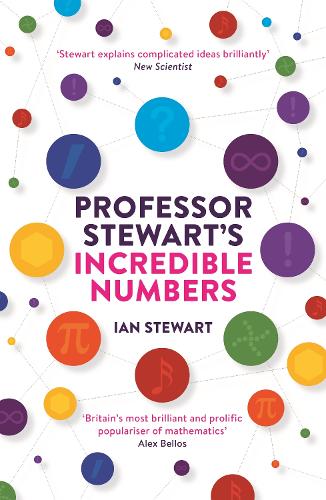
Professor Stewart's Incredible Numbers
(Paperback, Main)
Publishing Details
Professor Stewart's Incredible Numbers
By (Author) Professor Ian Stewart
Profile Books Ltd
Profile Books Ltd
16th March 2016
11th February 2016
Main
United Kingdom
Classifications
General
Non Fiction
510
Physical Properties
Paperback
352
Width 128mm, Height 198mm, Spine 28mm
240g
Description
Ian Stewart explores the astonishing properties of numbers from 1 to 10 to zero and infinity, including one figure that, if you wrote it out, would span the universe. He looks at every kind of number you can think of - real, imaginary, rational, irrational, positive and negative - along with several you might have thought you couldn't think of. He explains the insights of the ancient mathematicians, shows how numbers have evolved through the ages, and reveals the way numerical theory enables everyday life.
Under Professor Stewart's guidance you will discover the mathematics of codes, sudoko, Rubik's Cube, music, primes and pi. You may be surprised to find you live in eleven-dimensional space, that of the twenty- three people on a football pitch two are more likely than not to share the same birthday, and that forty-two is a very interesting number.
Professor Stewart's Incredible Numbers will delight everyone who loves numbers - including those who currently think they don't.
Reviews
Britain's most brilliant and prolific populariser of mathematics -- Alex Bellos
Praise for the app 'TouchPress and Stewart offer eight challenging dives into mathematical theory and practice for readers not intimidated by complex formulas and brain-bending concepts... The author swims easily through the sometimes turbid sea of numbers, and the clean graphics, sharp photos and well-designed features that accompany his lucid explanations will help draw readers along in his wake. * Kirkus *
Author Bio
Ian Stewart is Emeritus Professor of Mathematics at Warwick University. He has published more than eighty books including Mathematics of Life, Professor Stewart's Cabinet of Mathematical Curiosities, Professor Stewart's Hoard of Mathematical Treasures and The Science of Discworld trilogy with Terry Pratchett. He is a Fellow of the Royal Society, appears frequently on radio and television, and does research on pattern formation and network dynamics.
